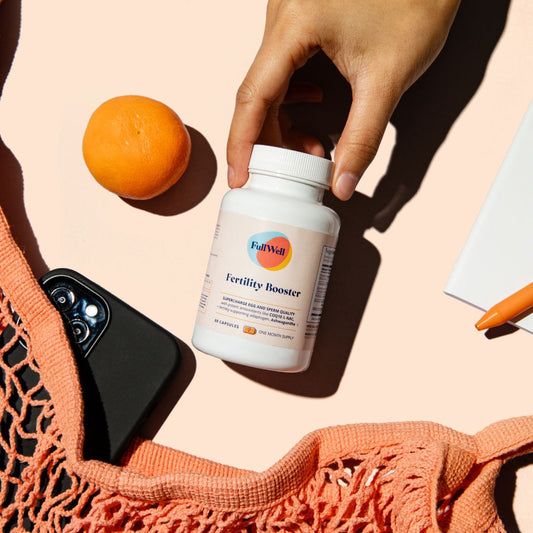Joyful Journeys: Stories of Preconception
Read more

What do celebs like Janet Jackson, Eva Mendes, Uma Thurman, Halle Berry, and Mariah Carey have in common? They have all given birth to children at the age of 40 or later!
This aligns with a global trend and a growing body of research related to delayed parenthood. Data from the Centers for Disease Control and Prevention (CDC) showed that births among women ages 40-44 rose almost continuously from 1985 - 2019, averaging about 3% per year, even as U.S. birth rates have continued to decline (1). The reasons to delay parenthood are as varied as the people making the decision. Some choose to wait until they feel more financially or emotionally prepared. Others might spend more time in search of the right partner (or choosing to fly solo!) or simply have a shifting interest in parenthood. And of course, some may have fertility challenges.
But contrary to popular belief, fertility doesn’t necessarily decline with age as consistently as we have been led to believe.
Many can relate to the idea of a (loud) biological clock ticking, counting down to the end of fertility. Though some aspects of this idea hold true - for instance, menopause does in fact mark the end of reproductive cycles - science shows us that age, as it relates to fertility is very complex. The truth is, like most things, it’s a matter that should be explored with the expertise of a trained healthcare provider and the support of your community.
Age is considered one of the most important factors in determining fertility because it is associated with a decrease in egg and sperm count and quality, and can often bring a decrease in the sex hormone levels that impact fertility and pregnancy rates (2) (3) (4). Age is also associated with an increased risk of fertility-related conditions, sexual performance challenges, and chronic diseases that can negatively affect fertility. Long-term exposure to environmental toxins like endocrine disruptors and other factors like alcohol may also have a negative effect on fertility in both men and women (5) (6). It is not a single factor but a combination of factors that may make conceiving, carrying a pregnancy to term, and birthing a child more difficult as you pass the 35 mark.
Reported infertility rates align with this age-related decline. According to CDC data, 30% of women aged 40-44 reported experiencing infertility compared to 25% of women aged 35-39 and 7-9% of women aged 15-34 (7). Though the decline in fertility is more gradual for men when compared with women, male factor infertility still attributes to 40-50% of all infertility cases. Reductions in several factors of male fertility related to age including semen parameters (semen volume and sperm quality), hormone levels, and sexual function are known to reduce fertility and pregnancy rates (3).
Females are born with all the cells that will eventually grow into eggs that they will carry, with the largest amount (~6-7 million) existing at around 20 weeks of gestation. Yes, you read that right! By 20 weeks, the female fetus will already carry egg cells. This egg count naturally depletes with age. At birth, this ovarian reserve drops to ~ 1 million. By age 40, ~ 5,000 eggs remain in reserve. Of these eggs, only one (or in the case of fraternal twins two eggs) will be released with the chance of fertilization each month - excluding individuals with irregular or abnormal ovulation.
Aging also has an essential impact on egg quality, or the genetic normality or abnormality of eggs in the ovarian reserve (8). Genetic normality plays a big role in the form, function, and fertilization of egg cells required to create an embryo and carry a pregnancy to term, while genetic abnormalities are known to increase the risk of pregnancy complications.
Promising research and clinical evidence show that with special considerations and adequate preconception screening, the use of IVF with donor eggs may be successful among women aged 40 and older, including those that have experienced menopause
(9). In this process, healthy donor eggs are fertilized with sperm from a partner or donor and implanted into the prospective parent. With continued advancements in IVF and other forms of assisted reproductive technology (ART), many consider this to be the best time in history for pregnancy in your 40s!
This information comes with the massive caveat that each individual and couple’s fertility health is unique (something we take into account when formulating all of our supplements intended to boost fertility). Research studies make conclusions that apply to groups and populations, not individuals. Some in their 40s may experience fertility challenges, while others might easily carry multiple pregnancies to term. Whether you are trying to conceive over 40 as a single parent or as part of a partnership, there are clear choices you can make to support your overall health and reproductive potential.
If you’re interested in optimizing your fertility in your 40s, the most important decision you can make to support your health is to develop a care team of qualified health professionals that suit your needs. For example, reproductive endocrinologists or OBGYNs will be equipped to medically support your reproduction plans, but other experts, like PCPs, dentists, therapists, and dietitians can, together, provide a comprehensive assessment of your overall functional health. With an increased risk of fertility challenges at this age, many experts also recommend a more advanced level of fertility and genetic testing for those interested in conceiving a child.
With a complete understanding of your (and your partner’s) health, you can be really proactive! The support of your healthcare team can help you heal, nourish, and restore all parts of your body and components of your fertility.
Inflammation and damage from free radicals are par for the course in our modern environments. Exposure to plastics, pesticides, pollution, and commonplace yet questionable personal care products are inescapable. Additionally, certain medications (like hormonal birth control), poor diet, and overexercise can deplete nutrient stores.
A whole, balanced diet filled with colorful, antioxidant-rich fruits and vegetables, quality protein, fiber, complex carbs, and healthy fats can support hormone levels and combat oxidative stress that accumulates from all of these factors.
Additionally, multivitamins and supplements can help “fill the gap” - even for individuals or couples that eat an otherwise healthy and balanced diet. Make sure to further support your fertility with a high-quality, third-party tested prenatal multivitamin that includes bioavailable forms of:
To supercharge your fertility, consider supplementing with CoQ10, Ashwagandha, and NAC, alpha-lipoic acid and broccoli seed extract (which we often refer to as the “fire hose for antioxidants”!). These nutrients can positively impact fertility in both male and female partners.
Regular movement also plays an important role in supporting your fertility at 40 and beyond! Physical fitness reduces the risk of chronic diseases and illnesses like high blood pressure, diabetes, obesity, cardiovascular disease, and cancer that have all been linked to significant impacts on fertility. Additionally, exercise (as long as it's not excessive) has been shown to have a protective effect on fertility by regulating hormones and reducing stress (10).
In addition to age, diet, and exercise, other lifestyle factors like smoking tobacco, using recreational drugs, drinking alcohol, and exposure to endocrine-disrupting chemicals can impact ovarian reserve, egg and sperm quality, fertility rates, and pregnancy outcomes. Additionally, exposure to these toxins has also been shown to result in genetic changes to egg and sperm cells (11).
